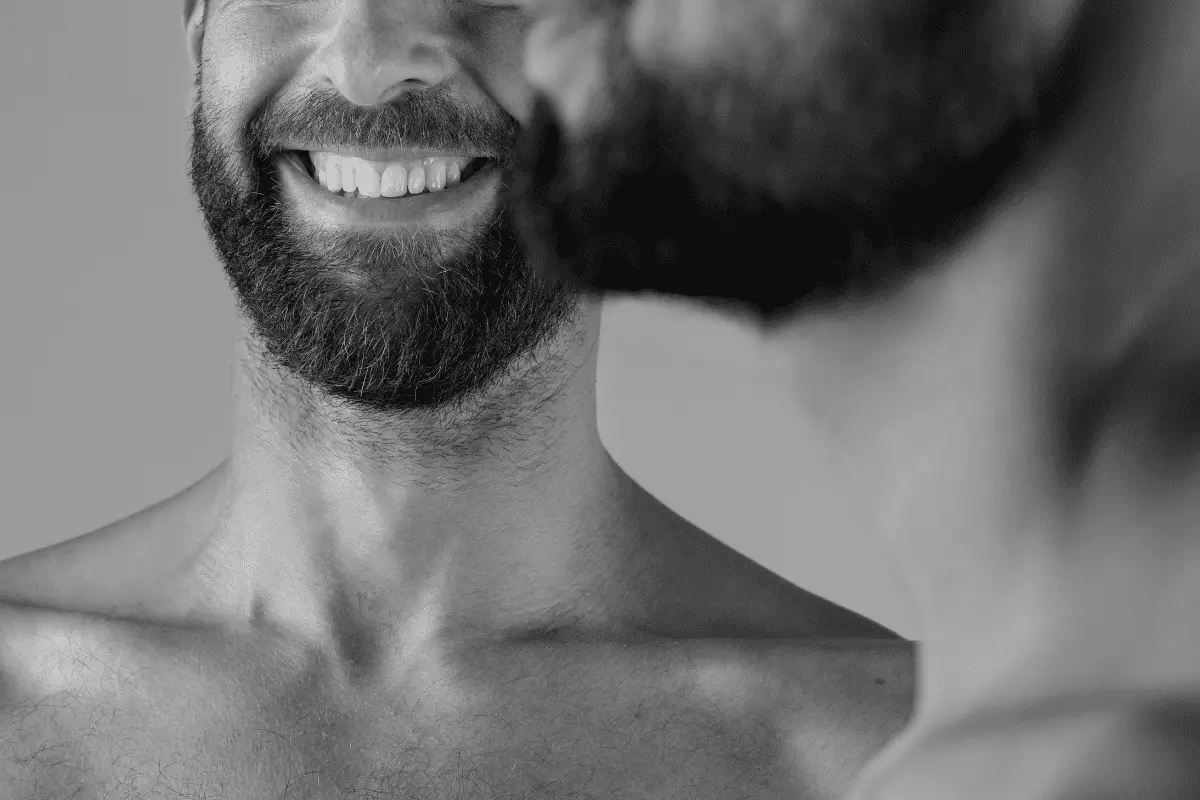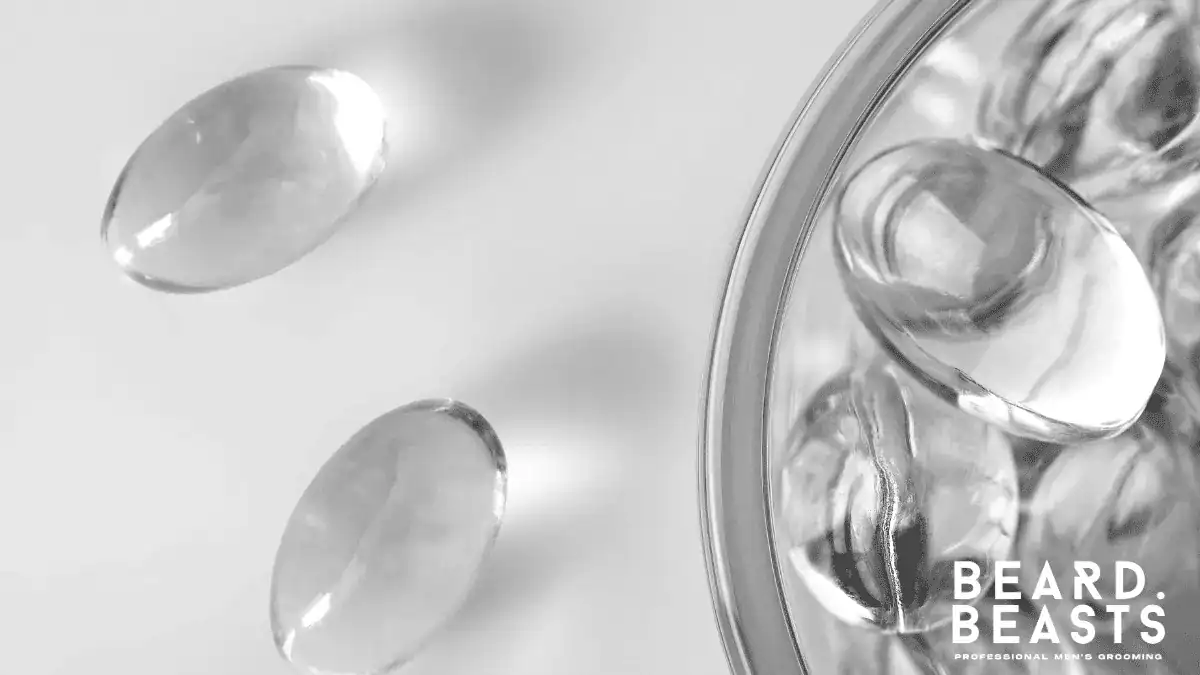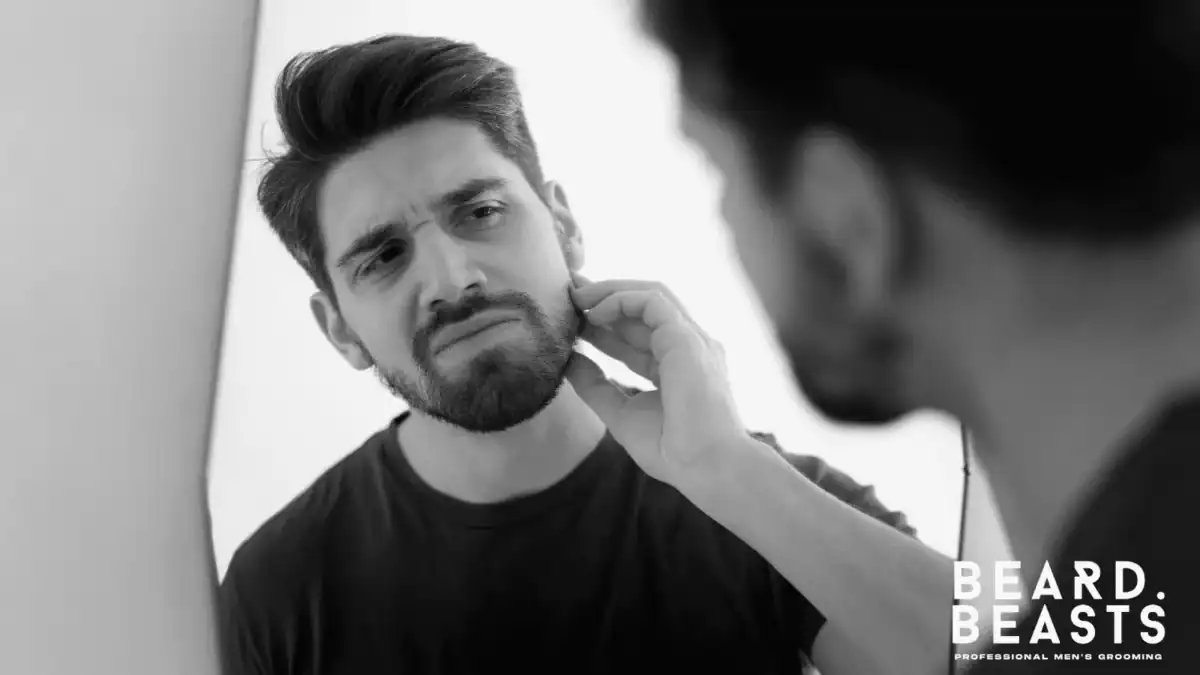Beard acne disrupts the look of a well-groomed beard and brings irritation that’s hard to ignore. Those breakouts don’t just impact your skin — they affect your confidence.
Facial hair creates a unique environment where oil, sweat, and debris build up fast, clogging pores and triggering inflammation. But with the right grooming strategy, those breakouts become a problem you can prevent and control.
This guide breaks down the real causes of beard acne and gives you a direct plan to deal with it. From targeted grooming habits to smarter skincare, you’ll learn how to protect your skin and keep your beard strong, clear, and comfortable.
What Causes Beard Acne and Pimples
Beard acne shows up for specific reasons — and most of them start beneath the surface. To stop breakouts for good, you need to understand exactly what’s happening under your beard.
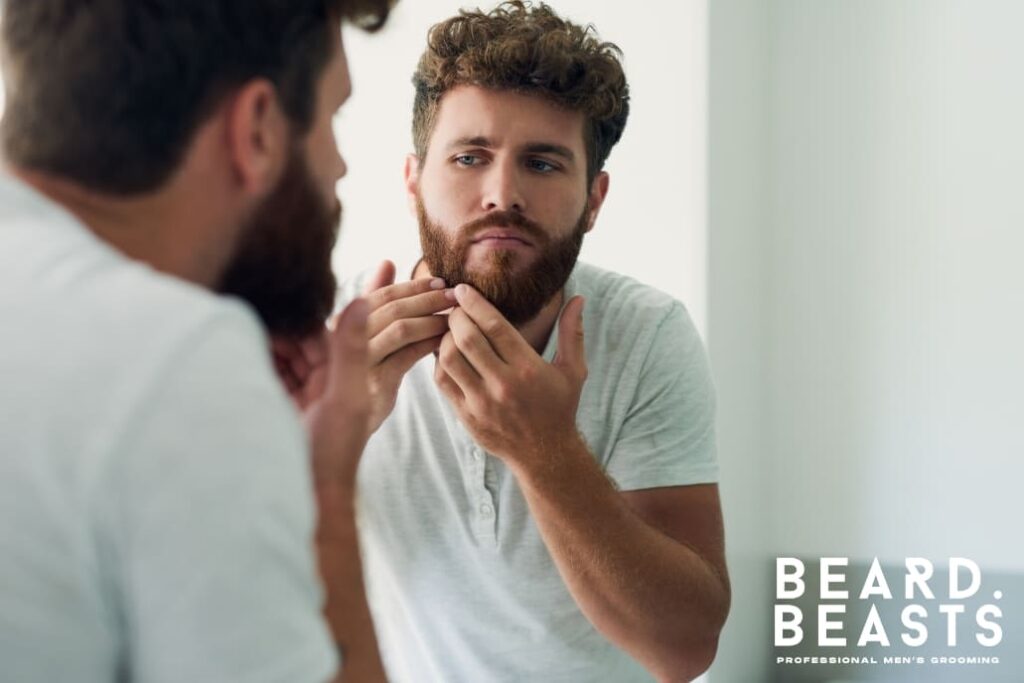
Poor Beard Hygiene
When you don’t wash your beard consistently, oil, dirt, and dead skin start to build up beneath the surface. This creates a breeding ground for bacteria and inflammation.
Over time, clogged pores become irritated and form painful breakouts.
Ingrown Hairs
Ingrown beard hairs develop when facial hair curls back into the skin instead of growing outward. This often happens when you shave too closely or use the wrong trimming technique.
The result is red, tender bumps that resemble acne and cause constant irritation. Preventing them requires smart grooming habits and attention to how your beard is trimmed.
Skincare and Beard Products
Not all beard products are skin-friendly — many contain heavy oils, synthetic fragrances, or comedogenic ingredients. These substances clog pores and trap bacteria against the skin, especially when layered daily.
Even well-intentioned products can do more harm than good if they block your skin’s ability to breathe. Choosing clean, non-comedogenic formulas is critical.
Internal Factors: Hormones, Diet, and Lifestyle
Fluctuations in hormones — especially androgens — increase oil production in the skin, which often leads to clogged pores and beard-area breakouts. These flare-ups are common during periods of stress, poor sleep, or other lifestyle shifts.
Your diet also plays a major role in skin health. Processed foods, excess sugar, and dehydration can trigger inflammation and weaken your skin’s ability to heal.
When your body’s balance is off, your skin shows it — especially beneath a beard. Managing stress, improving sleep, staying hydrated, and eating clean all support clearer skin and a healthier beard.
Recognizing what’s triggering your beard acne puts you back in control. Once you target the source, you can build a routine that keeps your skin clear and your beard looking its best.
How to Treat Beard Acne
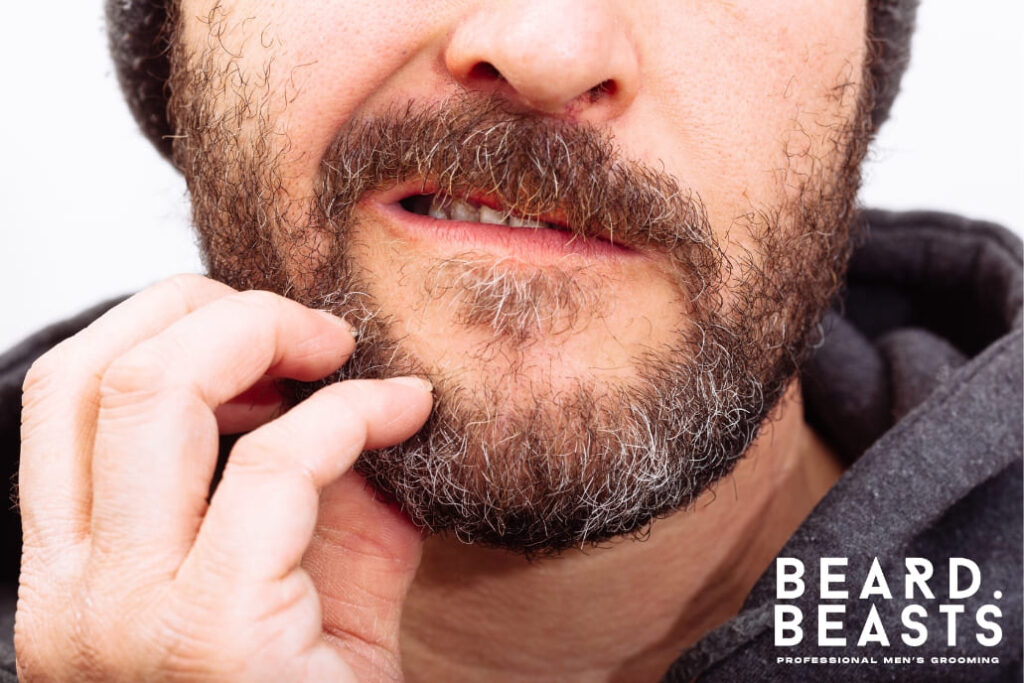
Beard acne doesn’t clear up overnight — it takes a focused, consistent routine. The key is treating the skin beneath your beard with habits that prevent breakouts and support long-term skin health.
Clean Your Beard Properly
Washing your beard daily is the foundation of any acne-fighting routine. Use a gentle, beard-specific wash that removes oil, sweat, and bacteria without stripping your skin.
Work the lather down to the roots to clean the skin beneath your beard — then rinse thoroughly. Avoid harsh shampoos with sulfates or alcohol, as they can dry out your skin and make acne worse.
Exfoliate Regularly
Exfoliating once or twice a week helps remove the dead skin cells that clog pores and trap hairs. Use a mild scrub or a soft-bristled beard brush to gently lift debris from your skin.
This improves circulation, reduces buildup, and helps prevent both acne and ingrown hairs. Just don’t overdo it — aggressive exfoliation can cause irritation and flare-ups.
Moisturize with Non-Comedogenic Products
Hydration keeps both your beard and the skin beneath it healthy, but product choice matters. Choose non-comedogenic beard oils and balms that won’t clog your pores.
Ingredients like jojoba or argan oil nourish the skin while keeping your beard soft and manageable. Avoid anything with synthetic fragrances, mineral oils, or heavy waxes that trap bacteria.
Treat Ingrown Hairs Carefully
When you notice an ingrown hair, act early to reduce inflammation and discomfort. Apply a warm compress to soften the area, then use clean tweezers to gently lift the hair if it’s visible.
Never dig into the skin — that only causes more irritation. To prevent them in the first place, shave with the grain using light pressure and a sharp razor.
Use Targeted Acne Treatments
Spot treatments with ingredients like salicylic acid or benzoyl peroxide can help reduce active breakouts. Apply a small amount directly to the affected area after cleansing and let it absorb fully.
Start with a low concentration to avoid over-drying the skin beneath your beard. If breakouts persist or worsen, consult a dermatologist for stronger, prescription options.
Sticking with these strategies will reduce beard acne over time and keep your skin in better shape. Results don’t happen overnight — but consistency pays off.
Make these habits part of your daily routine and your beard will not only look better but feel healthier too.
Preventing Future Beard Acne
Clearing beard acne is just the start — keeping it away takes consistent habits. With the right routine, you’ll protect your skin, maintain your beard, and avoid future breakouts.
Build a Solid Skincare Routine
Stick to a daily wash with a gentle, sulfate-free beard wash that won’t strip your skin. Exfoliate once or twice a week to remove buildup and prevent clogged pores.
Always moisturize after cleansing to restore hydration and keep the skin barrier strong. Choose a premium beard oil that nourishes without trapping bacteria.
Groom with Intention
Trim your beard regularly to keep it at a manageable length and reduce friction against the skin. Shave with the grain using light pressure to avoid ingrown hairs and irritation.
Comb your beard daily to distribute natural oils and prevent product buildup at the roots. And keep your grooming tools clean — bacteria on clippers or brushes can undo your progress fast.
Watch Your Lifestyle Habits
Hydration, diet, and stress management directly affect your skin. Drink water consistently and aim for a diet rich in healthy fats, antioxidants, and unprocessed foods.
Get quality sleep and keep stress in check — both support hormone balance and skin regeneration. Treat your lifestyle like part of your grooming plan.
Make prevention part of your routine, and your beard will stay clear, healthy, and easier to manage every day.
When to See a Dermatologist
Most beard acne clears up with the right grooming routine and consistent care. But if your breakouts persist, worsen, or become painful, it’s time to call in a professional.
Some skin issues look like acne but require medical treatment — and the longer you wait, the harder they are to manage. Knowing when to escalate saves you time, discomfort, and scarring.
A dermatologist can diagnose whether you’re dealing with acne, folliculitis, fungal issues, or something else entirely. They may recommend prescription treatments, medicated washes, or therapies that go beyond what over-the-counter products can do.
This is especially important if you’re experiencing deep cysts, ongoing irritation, or frequent ingrown hairs that don’t improve. Getting expert help ensures you’re targeting the real problem, not guessing.
If your breakouts don’t respond to regular grooming changes or worsen over time, it’s worth speaking to a dermatologist.
What Beard Acne Can Be Confused With
Not every bump under your beard is acne. Similar conditions often look the same but need different treatment. Knowing the difference helps you avoid the wrong approach — and fix the real problem.
Folliculitis
Folliculitis is an inflammation of the hair follicles, often caused by bacteria, yeast, or irritation. It looks like small red bumps or white-headed pimples, usually around hair roots.
Unlike standard acne, it may itch or sting and sometimes spreads in patches. Mild cases clear with better hygiene, but persistent ones may need medical treatment.
Razor Bumps (Pseudofolliculitis Barbae)
Razor bumps are caused by hairs curling back into the skin after shaving. They can look nearly identical to ingrown hairs and beard acne but are more common along the jawline and neck.
These bumps tend to show up shortly after shaving and often come with redness and irritation. The key to prevention is shaving with the grain and avoiding overly close cuts.
Contact Dermatitis
Contact dermatitis is a skin reaction triggered by allergens or irritants in grooming products. It may appear as red, flaky, or itchy patches beneath the beard — sometimes with raised bumps.
This condition isn’t caused by clogged pores, but by your skin’s reaction to something it doesn’t tolerate. Switching to fragrance-free, non-comedogenic products is the best first step.
Fungal Acne (Malassezia Folliculitis)
Fungal acne is caused by yeast, not bacteria, and thrives in warm, oily environments like the skin under your beard. It appears as small, uniform bumps that may feel itchy or tender.
Traditional acne treatments usually make it worse. Antifungal products are needed to treat it effectively.
Frequently Asked Questions
Still have questions about beard acne? Here are quick answers to the most common concerns men face.
How do I cure beard acne?
There’s no instant fix — but daily cleansing, weekly exfoliation, and non-comedogenic products help over time. Use targeted treatments as needed and consult a dermatologist if it persists.
Why does my beard give me acne?
Facial hair traps oil, dead skin, and bacteria, which clog pores and trigger breakouts. Inconsistent grooming and heavy products often make it worse.
Is growing a beard bad for acne?
Not if you care for it properly. A clean, well-maintained beard supports skin health — it’s neglect that causes problems, not the beard itself.
Will shaving my beard help acne?
It might in some cases, but shaving too closely can cause irritation or ingrown hairs. Proper grooming and skincare are often just as effective.
How often should I wash my beard?
Wash once daily with a beard-specific cleanser. After workouts or sweat-heavy days, a second rinse can help — just avoid harsh shampoos.
How do I exfoliate a beard?
Use a mild scrub or soft brush 1–2 times per week. Gently work it into the beard and rinse thoroughly to clear dead skin and buildup.
Stay consistent, stay informed — and your beard will look better, feel better, and stay breakout-free.
Final Thoughts
Beard acne doesn’t mean you’re doing something wrong — but it does mean your skin needs a smarter strategy. With the right grooming routine, targeted products, and a little consistency, you can take control of breakouts and keep your beard looking strong.
Focus on the skin beneath your beard, not just the hair itself. Clean daily, exfoliate weekly, and choose non-comedogenic products that support your skin — not sabotage it.
And if things don’t improve, don’t guess. Talk to a dermatologist and get expert advice tailored to your skin’s needs.
Clear skin. A healthy beard. Full control — that’s the Beard Beasts approach.



